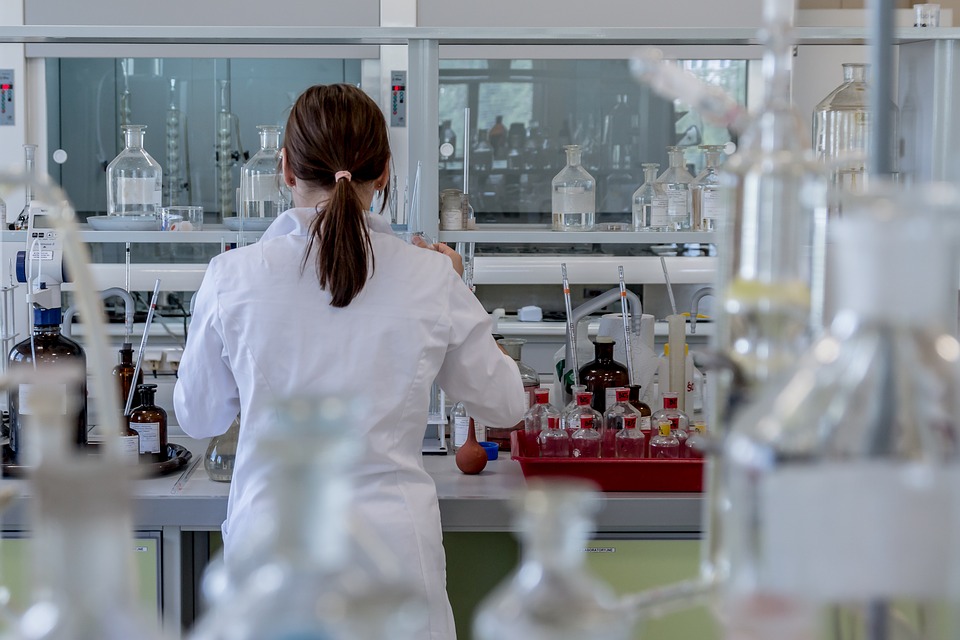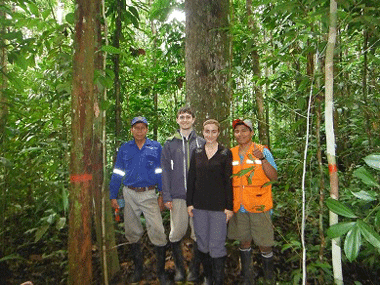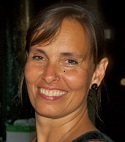Natural Sciences (Biological)
St John's College has a strong history in the Natural Sciences, including among our alumni the double Nobel Prize winning geneticist Frederick Sanger and the physicist Paul Dirac, one of the founders of Quantum Mechanics. We continue these traditions today, with a strong teaching fellowship maintaining broad interests across the sciences. There are at least fifteen Fellows and other teaching staff who are directly involved in supervising Natural Scientists in the College.
The Natural Sciences course at Cambridge is perhaps unique in the UK in its flexibility and broad scope. Throughout, the emphasis is on developing an understanding of principles so that graduates are well equipped to both understand and contribute to future scientific advances. The broad nature of the course is particularly well suited to modern science, where traditional subject boundaries are being abandoned in favour of cross-disciplinary approaches.

The 'Physical' and 'Biological' classifications in Natural Sciences are very flexible, and students often mix modules from the biological and physical sciences.
The supervision system is integral to teaching at Cambridge, and at St John's you will have regular supervisions, usually in groups of 2-3 students. In the first year you will have 4 supervisions per week, mostly with teaching Fellows from the college. The College also offers considerable additional support, including an excellent library, grants towards the costs of essential books and laptop computers and prizes for academic excellence in Natural Sciences.
We are also home to the Larmor Society, the Natural Sciences society of St John's College, named after the eminent alumnus Joseph Larmor. The Larmor Society organise talks spanning all areas of scientific research, connects students across years, provides guidance for subject choices and other science-related questions, and holds a variety of social events throughout the year.
Many students spend the summer carrying out research projects in UK or European universities. Students in the Biological Sciences have the opportunity to take part in a research project in the Peruvian Amazon, supported by a sustainable forestry initiative 'Green Gold Forestry'. Two students per year have spent their summer in the rainforest, carrying out a research project aimed at examining the effects of low impact logging on biodiversity and forest growth. Also, students can participate in an exchange program with California Institute of Technology.
Natural Sciences at St John's
Natural Sciences at St John's
View further details about the Natural Sciences Tripos and videos on the papers offered in the first year. Please note that these are aimed at incoming Freshers.
Course
Courses in Natural Sciences
The first year will involve choosing three (out of a possible eight) basic experimental subjects, plus an appropriate course in Mathematics. This will give you a thorough and broad foundation on which to build your chosen speciality.
Second year students choose three subjects, giving them the opportunity to become more specialised in a particular subject, or to retain a broad approach.

By the third year you will be specialising in one of seventeen subjects, chosen from a list that runs from Astrophysics to Zoology and includes Biochemistry, Chemistry, Genetics, Pathology, Pharmacology, Physiology, Development and Neuroscience (PDN), Plant Sciences, and Psychology.
In all Natural Sciences subjects it is possible to graduate with the BA Degree after three years. Four-year courses leading to the degrees of BA and MSci are available in eight subjects including Biochemistry, History and Philosophy of Science, and Systems Biology, subject to appropriate examination performance.
Students who read Natural Sciences during their first one or two years may also complete their degrees in another subject: for example, Chemical Engineering, Mathematics, or Management Studies.
Biology Subject Day Lectures
Find out what to expect from Biology at St John's by watching these lectures from our Biology Subject Days.
Watch Alex Taylor: Rewriting the Language of Life
Watch Dan Lu: How to Kill Cancer Cells
Watch Celine Glavaignon: The Role of Lipids in Parkinson's Disease
Entry Details
UCAS Code: BCF0
Typical Minimum Entry Requirements
A Level: A*A*A
International Baccalaureate: 42 points, with 776 at Higher Level
Essential Subjects: A Level/IB Higher Level in Mathematics and at least 2 other science/mathematical subjects
Desirable Subjects: None
Submitted Work: None
Admissions Assessment (pre-registration required): Applicants for Natural Sciences will need to sit the Engineering and Science Admissions Test (ESAT) in mid-October as part of the application to the University. Further information here.
You must register for pre-interview assessments so please do review this information carefully.
What we look for in prospective students
We take a flexible approach in the subject combinations we accept but whatever the combination it must be one that gives a sufficiently firm scientific foundation for the subjects that you would wish to take in the very broad first-year course. If you are in any doubt about the suitability of your combination of subjects as a preparation for the Natural Sciences Tripos, please contact us well before the deadline for submission of a formal application for advice.
We expect to admit about 30 students to read Natural Sciences every year, with approximately half classed as ‘Biological’ and half as ‘Physical’ Sciences. However, these classifications are very flexible, and students often mix modules from the biological and physical sciences, or change their preferred area entirely. In our last round of applications, we made offers to roughly 25% of Biological applicants.
Admissions Interviews
Candidates will have two interviews by the Director(s) of Studies and other teaching fellows, each lasting 20-25 mins. We conduct our interviews in a friendly and informal manner, and you should not feel too daunted by the prospect of them. No special preparation for the interview is necessary, or indeed desirable. One of the interviews will be concerned with subject-related topics, but we do not expect you to have detailed prior knowledge of topics outside of the areas you have covered at school. The interview is not a test of memory, but is concerned with exploring your ability to think through scientific problems. Often the problem will involve interpretation of a graph or similar scientific figure.
The other interview will set mathematical problems asked in the context of biology or chemistry. We do not use a digital whiteboard, but you should have a pencil and paper to hand.
No additional assessment will be asked at or before interview.
Please find example questions here.
People
Directors of Studies
Professor Uta Paszkowksi - Natural Sciences (Biological), Plant Sciences

Sub-Directors of Studies
Professor Jean Abraham - Pathology/Biology of Disease
Dr Michael Boemo - Mathematical Biology, Mathematical & Computational Biology
Professor Chris Jiggins - Evolution & Behaviour, Genetics, Ecology & Zoology
Prof Graham Ladds - Pharmacology
Professor Hugh Matthews - Physiology, Neurobiology
- Psychology
Professor Eric Miska - Molecular Biology, Biology of Cells
Dr Dániel Margócsy - History and Philosophy of Science
Professor Uta Paszkowski - Plant Sciences
Professor Andrew Woods - Quantitative Environmental Science
Tutor
Professor David Stuart
Subject Fellows
Dr Michael Boemo
Professor Simon Conway Morris
Professor Steve Edgley - supervisor in Neurobiology
Dr Kristian Franze
Professor Richard Gilbertson
Professor Chris Jiggins - supervisor in Evolution & Behaviour, Genetics, Ecology & Zoology
Professor Graham Ladds - supervisor in Pharmacology
Professor Ernest Laue
Dr Keith Matthews
Professor Eric Miska - supervisor in Molecular Biology
Professor Ole Paulsen
Professor Uta Paszkowski - supervisor in Plant Sciences
Dr Jeanne Salje
Dr Derek Wight
Dr David Williams
Dr Ian Winter
Professor Eske Willerslev
College Research Associates
Dr Alice Cezanne
Dr Alexandra Dallaire
Dr Andrea Dimitracopoulos
Dr Geraldine Jowett
Dr Eva Kreysing
Dr Aviad Levin
Dr Leonie Luginbuehl
Dr Hilary C Martin
Dr Joana Meier
Dr Jyoti Nangalia
Dr Jonathon Nixon-Abell
Dr Ruby Peters
Dr Sebastian Timmler
Dr Jenny York
College Teaching Associates
Dr Tereza Cindro-Davies - supervisor in Physiology of Organisms